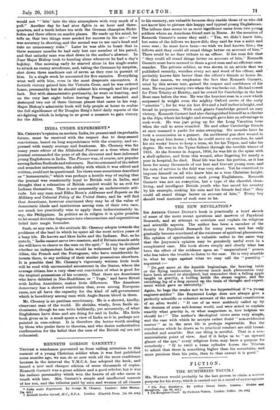KENNETH GORDON GARNETT- t Taouon a mischance prevented us from
calling attention to this memoir of a young Christian soldier when it was first published some months ago, we can do so now with all the more confide-ries because in the interval the Y.M.C.A. has adopted the book, and issued a new and cheaper edition of some thousands of copies. Kenneth Garnett was a great athlete and a good scholar, but it was his radiant personality which won the hearts of all who came in touch with him. Mrs. Gannett's simple and unaffected memoir of her son, and the tributes paid by men and women of all classes
India under Experiment. By George M. Chesney. London : John Murray.
Its. net.] Kenneth Gordon Garnett, N.C., R.F.A. London: Chiuwick Press. lie.-ed. net.] to his memory, are valuable because they enable those of us who did not know him to picture this happy and typical young Englishman. The tribute that seems to us most significant came from two young soldiers whom an American friend met in Rome. At the mention of Kenneth Gannett's name they said : "Yes, we didn't know him, but some of the fellows we know did; they said he was a saint and some man ; he must have been—we wish we had known him ; the fellows said they could all stand things better on-account of him." There could be no finer tribute to an officer. If his men felt that " they could all stand things better on account of him," Kenneth Garnett must have seemed to them a good man and an efficient com- mander. The private soldier, as was shown in an article that we published recently, watches every act and word of his officer, and probably knows him better than the officer's friends at home do. For that reason, we emphasize the fact that Kenneth Garnett, tried by this severe test, gained the respect and confidence of his men. He was just twenty-two when the war broke out. He had rowed for First Trinity at Henley, and he rowed for Cambridge in the last Boat-race before the war. He was the heaviest man in a crew which surpassed in weight even the mighty Oxford crews of the early "nineties " ; for he was six feet five and a half inches inheight, and broad in proportion. With such giants Cambridge gained an easy victory. Kenneth Garnett had also distinguished himself as a climber in the Alps, where his height and strength gave him an advantage in rock-work. He was just going up for the Long Vacation term -when the call to arms sounded. He and other Cambridge friends at once manned a yacht for mine-sweeping. Six months later he took a commission as a gunner. An accidental gun-shot wound in the leg sent him home ; when he could move on crutches, he used his six weeks' leave to keep a term, sit for his Tripes, and take his degree. He was in the Ypres Salient through the terrible winter of 1915. At the Somme in August, 1916, he was hit in the spine with a shell-splinter, and from this wound, after lingering for nearly a year in hospital, he died. Brief life was here his portion, as it has been for many thousands of our best and bravest young men, and his turn of service in the field was very short. Yet he contrived to impress himself on all who knew him as a true Christian knight. The war has revealed many such young Englishmen. Kenneth Garnett was not an exeeption, but a type of the cheerful, clean- living, and intelligent British youth who has saved his country by his example, making his men and his friends feel that " they could all stand things better on account of him." Every boy should read memoirs of such men as he.


























 Previous page
Previous page